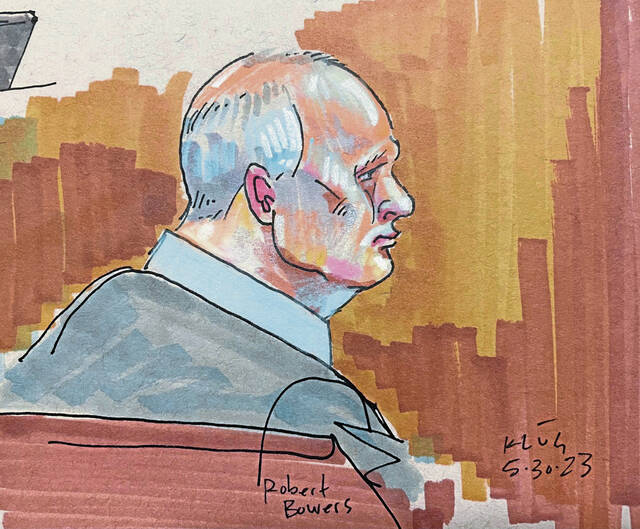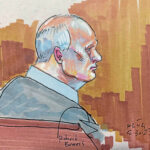The prosecution told jurors they had all the evidence they needed to find that Robert Bowers intended to kill.
He spent months planning the Tree of Life synagogue attack.
He stockpiled weapons and ammunition.
He announced his intentions online.
Assistant U.S. Attorney Soo Song said in her closing argument Wednesday that those facts were established before jurors found Bowers guilty last month. Since, during the trial’s eligibility phase, prosecutors have shared Bowers’ own chilling details in recounting the attack, the well-worn antisemitic tropes he followed almost like a menu and his regret that he didn’t kill more people.
“On Oct. 27, 2018, the defendant intended to kill every Jew he could hunt down in the Tree of Life synagogue,” she said. “Ladies and gentlemen, he fired his rifle more than 70 times.
“Every time he pulled the trigger on his AR-15, he was proving his intent to kill.”
In his closing argument, defense attorney Michael Burt told the jury that the issue of intent is not settled and the jury must first consider the mental health evidence they heard before deciding whether Bowers is eligible to be put to death.
“The issue in this case, did Mr. Bowers … act with conscious awareness or did he act based on a delusional belief system?”
Burt said it was the latter.
“What happens when your brain is broken? When you don’t have the ability to know what is truth and not truth when you’re given distorted information on the internet?” Burt said.
Bowers, 50, of Baldwin, was found guilty of killing members of the Tree of Life-Or L’Simcha, Dor Hadash and New Light congregations who were worshiping at the Squirrel Hill synagogue on Oct. 27, 2018.
The 11 people killed included Rose Mallinger, 97; Bernice Simon, 84, and her husband, Sylvan Simon, 86; brothers David Rosenthal, 54, and Cecil Rosenthal, 59; Dan Stein, 71; Irving Younger, 69; Dr. Jerry Rabinowitz, 66; Joyce Fienberg, 75; Melvin Wax, 87; and Richard Gottfried, 65.
The second phase of the trial, to determine whether Bowers is eligible for the death penalty, began June 26. For the defendant to be eligible for capital punishment, the government must prove that Bowers intended to kill and at least one of four aggravating factors, including that eight of the 11 victims were vulnerable. The defense has conceded the government met that factor.
If the jury finds that Bowers is eligible for the death penalty, the trial will move into a third phase to determine his sentence. The sentence selection phase would likely feature extensive victim impact testimony from the government, as well as mitigating evidence from the defense team.
The jury began deliberating on Bowers’ eligibility for the death penalty late Wednesday afternoon and will return Thursday.
The prosecution and defense gave their closing arguments in two very different styles.
Song, who spoke for less than 30 minutes, used emotion and graphic detail to remind the jurors of the horrific nature of the crime. The defense spoke for more than 90 minutes and recounted extensive testimony from witnesses, including using a PowerPoint presentation to show transcripts of their testimony, the brain imaging results and test data that featured prominently in this phase of the case.
Song told the jurors that the question they must answer in their deliberations — whether there was intent — was answered for them through the evidence.
Bowers began planning his crime in April 2018 and spent months picking out a “high-value, high-impact” target.
Then, Song continued, when Bowers was interviewed by his own experts last year, he recounted for them explicit, graphic details of the crime scene — how he intended to create the most carnage, used ammunition selected for that purpose, and how he remembered what the victims looked and sounded like.
As for the defense claims of schizophrenia and epilepsy, Song told the jurors they must evaluate the “believability and trustworthiness” of that evidence.
“It is not worthy of your alliance,” she said. “You heard no clear or compelling evidence the defendant has schizophrenia or whether his beliefs about Jews are delusional.”
Instead, she said that what the defense experts claimed were delusions were simply the beliefs of an entire subculture of white supremacists.
“Not one of them is unique or different,” Song said.
She characterized this decision for the jury as “much less complicated.”
“Even if he did have schizophrenia, that diagnosis does not and would not determine whether the defendant had the capacity to form the intent to kill,” Song said.
But the core of the defense’s closing argument rested on Bowers’ beliefs being the product of delusional thinking — not a political ideology.
Burt told the jury Bowers’ delusions were responsible for him constantly talking about an immigrant invasion and “being a soldier” in protecting the white race, as well as his accusations that Jews were a major player in increasing immigration in the United States.
“The government would have you believe this is normal political thinking,” Burt said. “If that is part of political discourse folks, then we are in trouble.”
He dismissed Song’s argument that the jurors have already found intent.
“The real evidence has to do with the brain and what we can say about Mr. Bowers’ brain,” he said.
Burt then spent more than an hour recapping expert witness testimony.
He talked about the MRI of Bowers’ brain that showed white-matter hyperintensities, or lesions, that can be indicative of schizophrenia and other ailments such as high blood pressure and migraines.
He talked about the EEG, which showed some unusual activity. And he talked about a PET scan that showed some abnormalities in how Bowers’ brain metabolizes glucose.
Burt then turned to the government’s expert witnesses, Dr. Ryan Darby and Dr. Park Dietz, who both found that the defendant does not have schizophrenia or epilepsy.
Dietz testified that he believes Bowers has schizoid personality disorder, which falls on the same spectrum, but is not caused by a pathological disease process, making him, he said, not mentally ill.
“The only disagreement is how he defines delusions,” Burt said.
While two of the defense experts said Bowers has delusions, both Darby and Dietz said that’s not the case.
Burt also talked about the money earned by the government experts in the case — nearly $400,000. He accused Dietz and his company of providing diagnoses to legal clients as a means to cash out, instead of providing accurate medical assessments.
“Our experts were all independent experts, not all working under one roof,” Burt said of the doctors called by the defense. “Are (Dietz and Darby) simply rendering opinions because they are getting paid a lot of money to do so?
“Are these experts being motivated by the financial profit involved?”
U.S. Attorney Eric Olshan, who gave the government’s closing in rebuttal, spoke for 40 minutes.
He countered the defense’s argument by saying that Bowers’ ideology was not born out of delusions and he was instead choosing to follow a list of well-trodden white supremacist talking points.
“He didn’t come up with any on his own, he just went to the menu of white supremacist ideologies,” he said.
Olshan dismissed the notion that Bowers is mentally ill and urged the jurors not to be distracted by those defense claims.
“Ladies and gentlemen, your job is simple: Did the defendant have the intent to kill?” Olshan said.
He noted that the defense never asked their own experts that question.
“That’s because they don’t want you to think about how simple that question is. That the evidence establishes, conclusively, that this man, absolutely, could form the intent to kill.”











